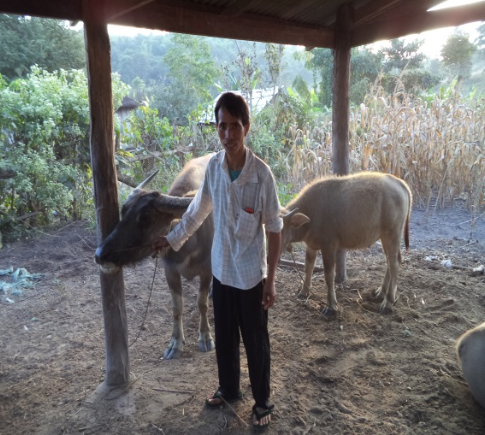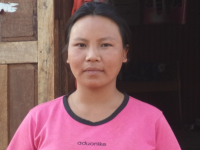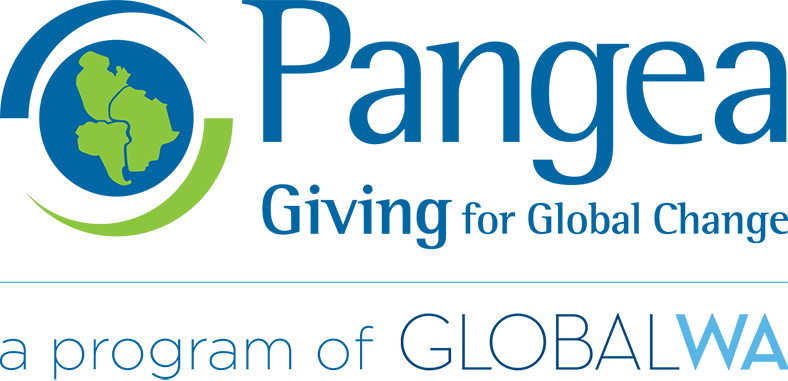U Hae & Nar Law Stories – Myanmar
Since 2004, Meikswe Myanmar, located in Lasio in Northern Shan State, has provided comprehensive services to promote health, early childhood education and community development. The following stories profile two of the beneficiaries of Pangea Giving’s support to this NGO.
 U Hae Sar‘s family has lived in San Laung (Lisu) village for 14 years. A farmer, he earns his livelihood from growing rice and soybeans. The seed is grown during the rainy season but previously they didn’t have a buffalo for ploughing and hauling soil amendments; the work had to be done either manually or by hiring a buffalo, thus adding to cost and unpredictability in their planting schedule. The income from crops lasted only about five months; to survive they had to borrow money, creating ongoing debt; daily life was very difficult.
U Hae Sar‘s family has lived in San Laung (Lisu) village for 14 years. A farmer, he earns his livelihood from growing rice and soybeans. The seed is grown during the rainy season but previously they didn’t have a buffalo for ploughing and hauling soil amendments; the work had to be done either manually or by hiring a buffalo, thus adding to cost and unpredictability in their planting schedule. The income from crops lasted only about five months; to survive they had to borrow money, creating ongoing debt; daily life was very difficult.
Pangea Giving funding to Meikswe provided U Hae Sar with buffaloes and a cart, making the plowing and hauling more efficient and planting more predictable. He can now plant 3 times a year, increasing yields that provide food for the family year-round, surplus to sell for income, and the elimination of debt. With the extra income, his sons are now in school, grades 5, 3 and 1. His younger daughters will also be able to attend school. The family donates to their church and to other social needs in their village. The security of predictable planting schedules and income have provided more time for the family to serve their community, with activities such as clearing drainage and repairing roads and water pipes.
U Hae Sar’s family now encourages other families in their struggle for sustainable livelihoods. They especially want to give assistance for other children’s education in the hope that the next generation will have the tools needed for the development of their community.
 My name is Nar Law Bo. I am 29 years old, married and live in Bom Mom village, 14 miles from Lashio, Northern Shan State. I have 2 children, a daughter who is 8 years old and a 10-month old son. Our family’s income comes from planting corn and rice on the uplands.
My name is Nar Law Bo. I am 29 years old, married and live in Bom Mom village, 14 miles from Lashio, Northern Shan State. I have 2 children, a daughter who is 8 years old and a 10-month old son. Our family’s income comes from planting corn and rice on the uplands.
Even though I am married, I am very ambitious to become an educated person. Starting four years ago, I began a correspondence course in geography education at Lashio University. Initially, in order to support my education, I had to borrow from a money lender with interest that I repaid after corn harvesting. Though my husband was very supportive, the stress of paying for the many university fees, food, transportation and accommodation was a burden for me and my family. At that time, I was also serving as a community volunteer teacher at Bon Mon primary School to augment the shortage of government teachers.
After my first year of study, I was given an education grant by MEISKWE with the support of Pangea funds. I never dreamt that I could receive assistance for my education. The elimination of financial stress freed me to learn properly and I’m now a 4th year student and ready to graduate.I am the only person in my village who will have graduated from a university and all the villagers are proud of me. Whenever meetings or discussions occur, villagers ask me to take notes for village documentation. I am also a village worker and assist people in health promotion. In order to assist in educating our children, I attended a one-month course last year at ECCD ( Early Child Care Development) and became the teacher at the ECCD center that facilitates activities for 3- to 5-year-old children in the village. Through their indoor and outdoor activities the children learn together, gaining skills and using their creativity. In my free time, I can assist my own child as well as the other children related to the course. When we meet at the community center, I encourage all parents to send their children to school. Even though the village has many challenges, if our children are educated they will bring their knowledge and skills to lead our village’s development and uplift our minority ethnic status.
